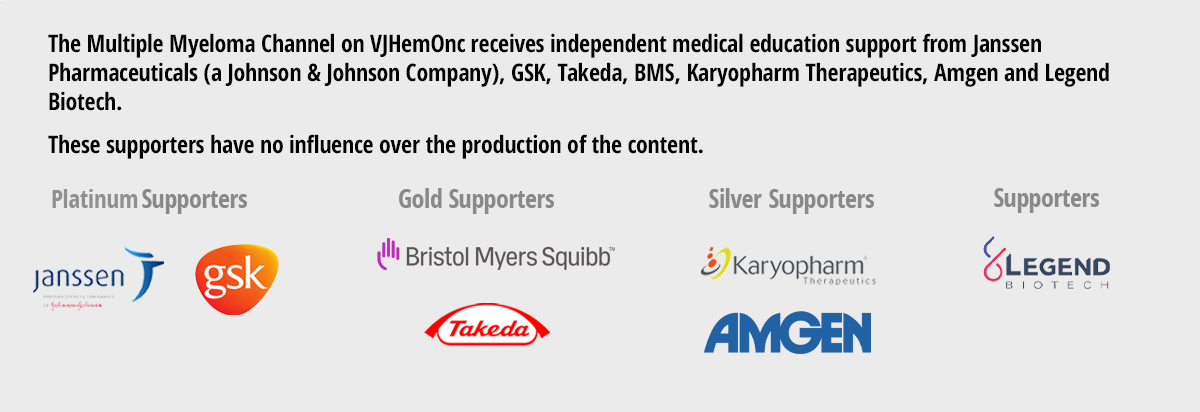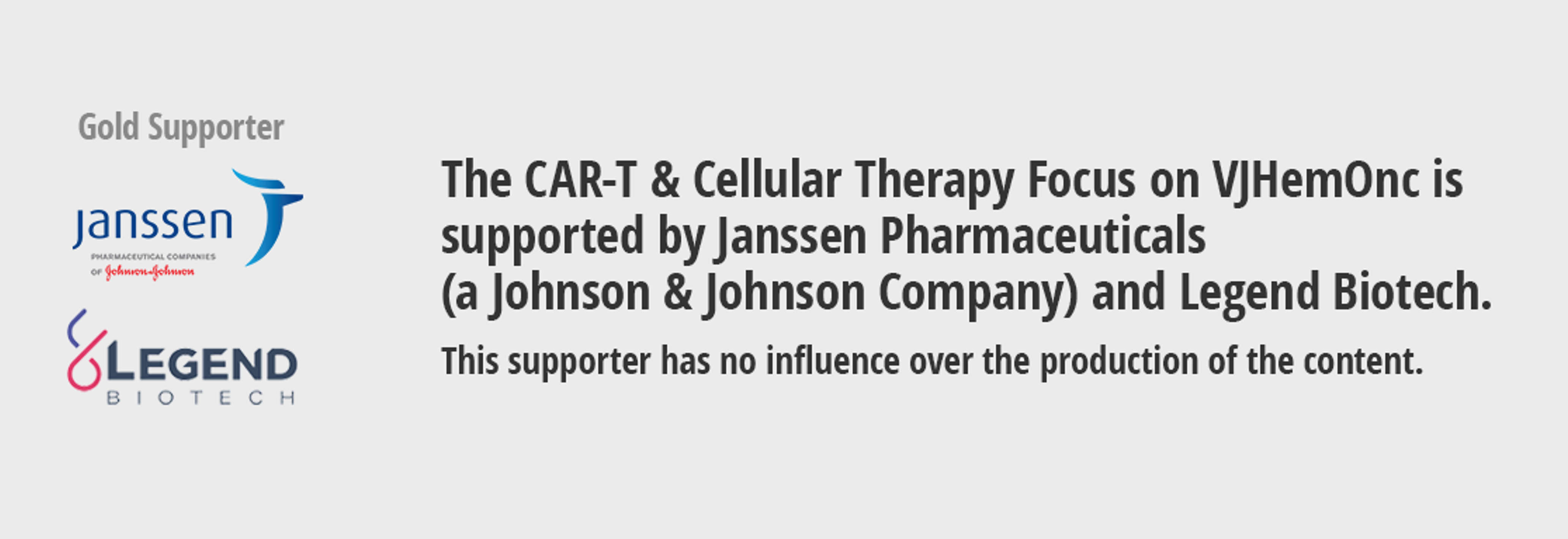Educational content on VJHemOnc is intended for healthcare professionals only. By visiting this website and accessing this information you confirm that you are a healthcare professional.
CARAMBA-1: a Phase I/IIa trial of autologous SLAMF7 CAR-Ts in multiple myeloma
CAR-T therapy has marked a paradigm shift in the treatment of hematological malignancies like multiple myeloma. However, the cost and time associated with the manufacturing of autologous CAR-T products have been major obstacles limiting the access of these therapies to patients. It is thus essential to find new effective strategies to make CAR-T therapies more cost-effective and accessible.
In this video, Michael Hudecek, MD, University of Würzburg, Würzburg, Germany, discusses the CARAMBA-1 study (NCT04499339), which is the first clinical trial to utilize virus-free CAR gene transfer using advanced Sleeping Beauty (SB) transposon technology. This novel promising approach could provide a cheaper alternative to current autologous CAR-T technology.
While most CAR-T treatment approaches in multiple myeloma have used B-cell maturation antigen (BCMA) as a target antigen, the CARAMBA-1 study chose to evaluate SLAMF7, which has a high and uniform expression on malignant plasma cells. In addition, pre-clinical studies have shown that T-cells expressing a SLAMF7 CAR have a potent anti-tumor activity.
The CARAMBA study is a Phase I/IIa clinical trial comprised of a dose-escalation and dose-expansion. Currently, the trial has enrolled 38 patients with multiple myeloma who have received at least three prior lines of treatment across different sites in Europe.
The study is currently going through the dose-escalation phase and has reported positive safety signals, with indications of anti-myeloma efficacy. Further results on the efficacy of these SB-based SLAMF7 CAR-Ts at higher dose levels will be communicated over coming months.1
Approved CAR-Ts in R/R ALL: tisa-cel and brexu-cel
Acute lymphoblastic leukemia (ALL) is commonly treated with induction and consolidation chemotherapy alone or in combination with other therapeutic approaches such as hematopoietic stem cell transplantation (HSCT). However, although complete remission (CR) is reported in some patients, many experience disease relapse. In addition, HSCT can lead to major complications such as graft-versus-host disease (GvHD). Therefore, more effective and well-tolerated treatment options are needed for patients with relapsed/refractory (R/R) ALL.2
The first CAR-T product, tisagenlecleucel (tisa-cel), was approved in August 2017 for the treatment of pediatric and young adult patients with R/R B-cell precursor ALL (B-ALL) in the third-line setting.3
In this video, Mohamad Mohty, PhD, Saint-Antoine Hospital, Paris, France, highlights data from key clinical trials evaluating approved and emerging CAR-Ts in ALL.
The approval of tisa-cel was based on the results of the Phase II ELIANA study (NCT02435849), which evaluated tisa-cel in 63 patients with R/R B-ALL and reported an impressive overall remission rate of 83% within three months of treatment.3 In addition, all patients in remission had measurable residual disease (MRD) negativity. However, tisa-cel treatment was associated with a high incidence of side effects: 77% of patients experienced cytokine release syndrome (CRS) and 40% of patients experienced immune effector cell-associated neurotoxicity syndrome (ICANS).4 Longer-term follow-up of the ELIANA study demonstrated high response rates and an overall survival (OS) rate at 18 months of 70% (95% CI, 58%–79%).5
Brexucabtagene autoleucel (brexu-cel) is another promising CD19-targeted CAR-T therapy currently being evaluated in the Phase I/II ZUMA-3 study in adult patients with R/R B-ALL (NCT02614066). Interim data reported from this study showed that 71% (95% CI 57–82, p<0.0001) of patients treated with brexu-cel achieved CR or CR with incomplete hematological recovery (CRi) after a median follow-up of 16.4 months (95% CI 13.8–19.6, p<0.0001). The median duration of remission was 12.8 months (95% CI 8.7–not estimable), and median OS was 18.2 months (15.9–not estimable). Among patients who responded to treatment, 97% were MRD negative. The most common grade 3 or higher adverse events included anemia (49%), pyrexia (36%), neurotoxicity (25%), and CRS (24%).6
Overall, the current reported results from ELIANA and ZUMA-3 demonstrate the durable benefit and manageable toxicity of CD19-targeted CAR-Ts in patients with ALL. Prof. Mohty shared his views on the future of CAR-T in ALL:
“Clearly the field of ALL is moving towards more and more patients receiving CAR-Ts, and the next question is about how to move these cells towards earlier lines of treatment and maybe figure out whether they can change the use of allogeneic HSCT or be used as a bridge for alloHSCT.“
Emerging CD19-targeted CAR-T treatment approaches for NHLs
CAR-T therapy has changed the therapeutic landscape for B-cell non-Hodgkin lymphoma (NHL) over the past few years. Initially approved for patients with B-cell acute lymphoblastic leukemia (B-ALL), CD19-targeted CAR-T therapies are now used to treat other hematological malignancies such as diffuse large B-cell lymphoma (DLBCL), mantle cell lymphoma (MCL) and follicular lymphoma (FL) due to high expression of the CD19 antigen across all B-cell malignancies.7 Ongoing clinical trials are evaluating the efficacy of CD19-targeted CAR-T approaches in an even wider range of hematological malignancies such as chronic lymphocytic leukemia (CLL), central nervous system (CNS) lymphomas, and indolent and aggressive B-cell lymphomas.
In this interview, Ulrich Jäger, MD, Medical University of Vienna, Vienna, Austria, outlines some of the recent progress in CAR-T therapies for B-NHL and other hematological malignancies.
Despite the high initial efficacy of CAR-T therapies, the relapse rate in patients with B-NHL remains notable. It is thus critical to design new, more effective CAR-Ts. Using bispecific CAR-Ts targeting two antigens such as CD19 and CD20, or CD19 and CD22 to prevent tumor escape mechanisms is a promising strategy under investigation.7
Another major challenge in CAR-T therapy is manufacturing. Currently, producing autologous CAR-Ts is a costly and time-consuming process, and manufacturing failures can limit access to CAR-T therapy. Allogeneic CAR-Ts represent a promising alternative to autologous CAR-Ts. Indeed, using T-cells derived from healthy donors, it is possible to generate off-the-shelf CAR-T products for a large number of patients. However, allogeneic products can lead to CAR-T rejection and GvHD. Gene editing approaches have been proposed to overcome these issues.7
Although CAR-T therapies have significantly improved outcomes for patients with B-NHL, several challenges remain and need to be addressed to unlock the full potential of CAR-T therapies.
Exciting developments in the CAR space: novel target antigens, CAR-NKs & switchable CAR-Ts
The promise of CAR-T therapy has led to rapid progress in the development of innovative strategies aiming to overcome some of the current issues associated with this cellular therapy.
In this video, Michael Schmitt, MD, PhD, University Clinic Heidelberg, Heidelberg, Germany talks on some of the most exciting advances in the CAR space.
There are currently many efforts to identify new target antigens for CAR-T therapy. BCMA, the most widely studied myeloma CAR target, has recently emerged as an alternative target for B-cell neoplasms. Indeed, evidence shows that BCMA is also expressed on the surface of malignant cells in DLBCL, FL, MCL, B-ALL, and CLL. In addition, it has also been shown that anti-BCMA CAR-Ts can eradicate B-NHL cells both in vitro and in vivo.8 Other novel targets for CAR-T therapy like CD30, CD37, CD38,9 and ROR1 are under investigation.
There is also a growing interest in CAR-transduced natural killer cells (CAR-NKs). CAR-NKs have several benefits over CAR-Ts. Indeed, not only are they associated with a lower incidence of CRS and neurological events in the autologous setting, and GvHD in the allogeneic setting, but they can also easily be manufactured as off-the-shelf products. In addition, CAR-NKs can eliminate malignant cells via both CAR-dependent and NK cell receptor-dependent mechanisms. Many clinical trials are now evaluating the efficacy of CAR-NK cells in a variety of solid and liquid tumors.10
Further research on targets for CAR-T therapy, CAR-NKs, and other novel CAR engineering strategies is ongoing and is expected to greatly affect the outcomes of patients with hematological malignancies in the future.
Watch all CAR-T Meeting 2022 videos here
References
- Prommersberger S, Reiser M, Beckmann J, et al. CARAMBA: a first-in-human clinical trial with SLAMF7 CAR-T cells prepared by virus-free Sleeping Beauty gene transfer to treat multiple myeloma. Gene Therapy. 2021 April 13; 28, 560–571.
- Sheykhhasan M, Manoochehri H, Dama P. Use of CAR T-cell for acute lymphoblastic leukemia (ALL) treatment: a review study. Cancer Gene Therapy. 2022 January 5.
- U.S. Food and Drug Administration. FDA approval brings first gene therapy to the United States. Available from https://www.fda.gov/news-events/press-announcements/fda-approval-brings-first-gene-therapy-united-states. (Last accessed 23/02/2022).
- Martino M, Alati C, Antonio Canale F, et al. A Review of Clinical Outcomes of CAR T-Cell Therapies for B-Acute Lymphoblastic Leukemia. International Journal of Molecular Sciences. 2021 February 21; 22, 2150.
- Frigault MJ, Maus MV. State of the art in CAR T cell therapy for CD19+ B cell malignancies. Journal of Clinical Investigation. 2020 April 1; 130, 1586–1594.
- Shah BD, Ghobadi A, Oluwole OO, et al. KTE-X19 for relapsed or refractory adult B-cell acute lymphoblastic leukaemia: phase 2 results of the single-arm, open-label, multicentre ZUMA-3 study. The Lancet. 2021 August 7; 398, 491–502.
- Yin Z, Zhang Y, Wang X. Advances in chimeric antigen receptor T-cell therapy for B-cell non-Hodgkin lymphoma. Biomarker Research. 2021 July 13; 9, 58.
- Dogan A, Siegel D, Tra N, et al. B-cell maturation antigen expression across hematologic cancers: a systematic literature review. Blood Cancer Journal. 2020 June 30; 10, 73.
- Marofi F, Rahman HS, Achmad MH, et al. A Deep Insight Into CAR-T Cell Therapy in Non-Hodgkin Lymphoma: Application, Opportunities, and Future Directions. Frontiers in Immunology. 2021 June 23; 12, 681984.
- Xie G, Dong H, Liang Y, et al. CAR-NK cells: A promising cellular immunotherapy for cancer. EBioMedicine. 2020 September 1; 59, 102975.
Edited by Thomas Southgate





















